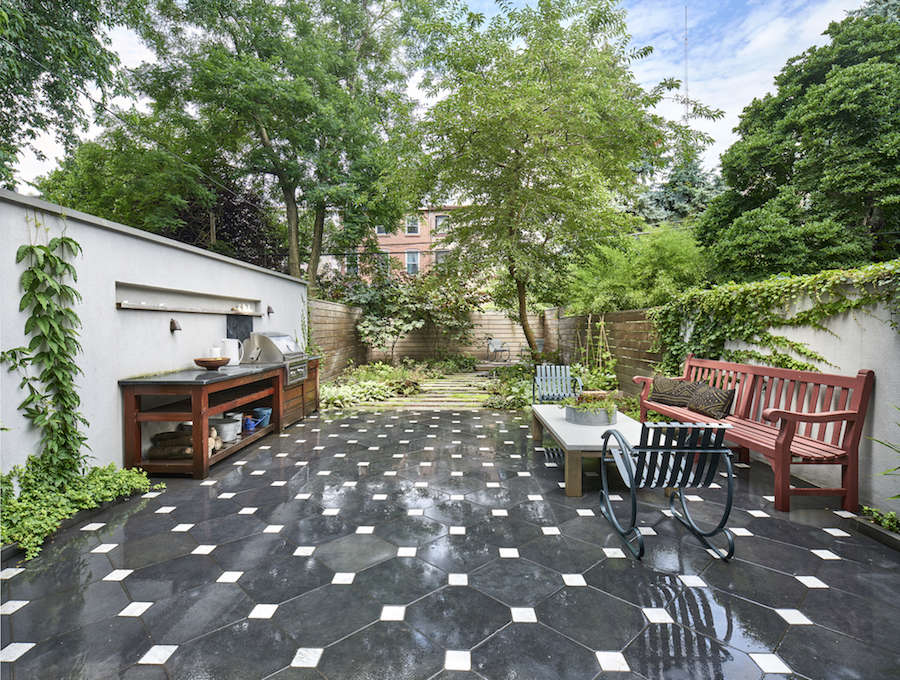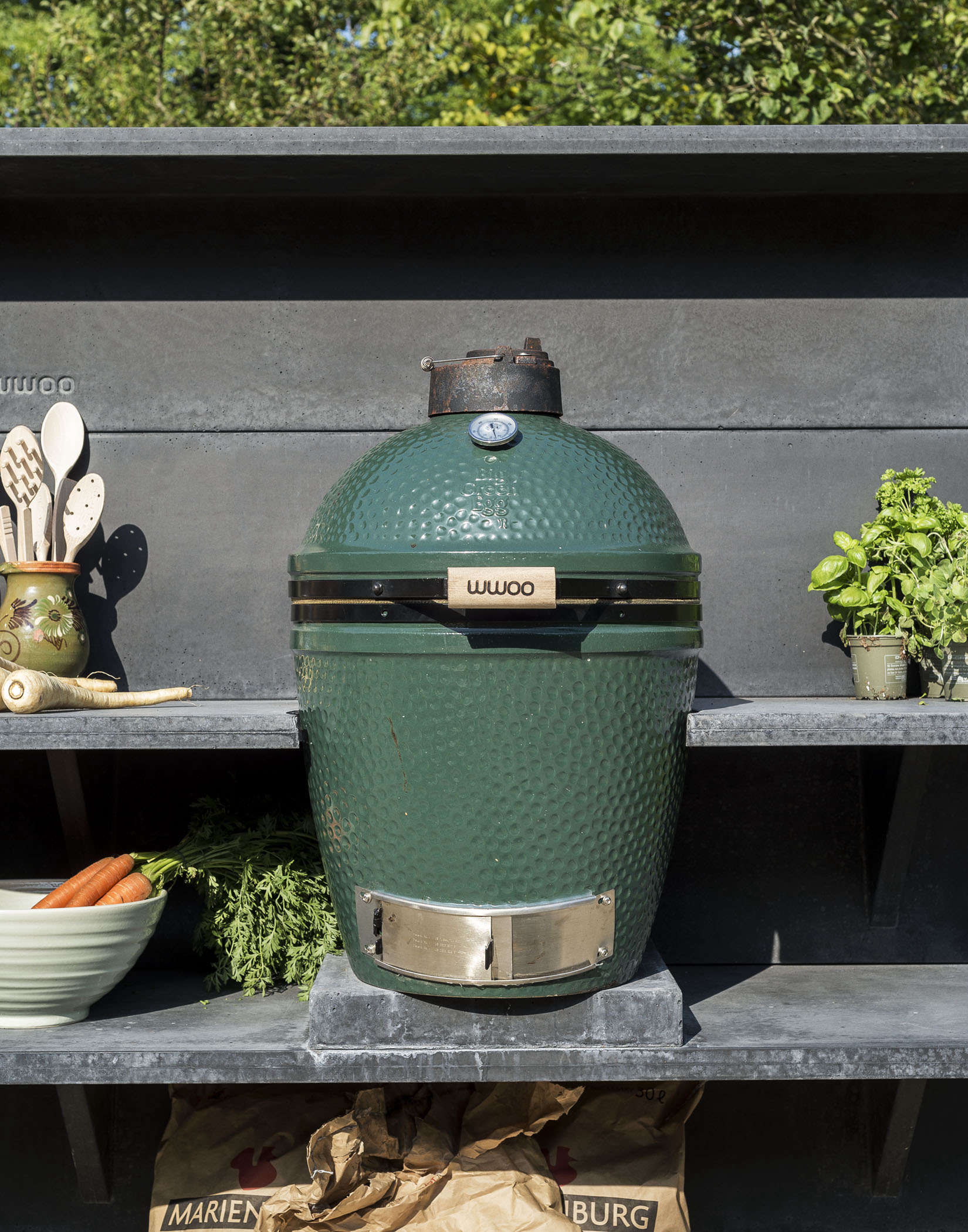Food cooked outdoors tastes better. And while the phrase “outdoor kitchen” can describe a setup as modest as a grill on wheels, a built-in barbecue is a hardscape feature that elevates the act of cooking outdoors to a pleasure.
When you design an outdoor kitchen with a built-in barbecue, it’s a good opportunity to create countertop space for prep and under-counter storage. Read on for everything you need to know about designing a built-in barbecue:
Above: The use of a single material—yellow cedar—on backsplash, under-counter cabinets, and a storage closet unifies the look in a San Francisco garden designed by architect Brennan Cox. For more, see Steal This Look: An Outdoor Kitchen Hidden from the Tourists on Lombard Street. Photograph courtesy of Brennan Cox.
What is a built-in barbecue?
A built-in barbecue—also known as a barbecue island—is a structure with a grill (and possible other amenities) that creates an outdoor kitchen.
In the 1950s, custom-built barbecues were very popular before mass-produced charcoal and gas grills took over. Now, the look and function of a built-in barbecue is back in demand.
Above:Photography courtesy of Belathée Photography.
An outdoor kitchen in Seattle blends family entertaining with modern Scandinavian-influenced design. Outdoor kitchen appliances include an Artisan gas grill, U-Line refrigerator, and Broan hood. For more, see Sleekness in Seattle: Modern Landscape, Midcentury House.
Do I need a built-in barbecue?
A built-in barbecue can be expensive, so you may want and/or need this outdoor feature for a few reasons:
- A sizable structure can be accommodated into your landscape.
- You frequently barbecue and entertain so it will be well used and not become a spider hotel.
- Extra storage and shelf space for prep, cooking, and serving large groups is one your “Need” list.
- Adding value to your home is a priority.
Above: Photograph by Dan Wonderly courtesy of Kim Hoyt Architect.
A simple outdoor kitchen in this Brooklyn outdoor space designed by architect Kim Hoyt doesn’t distract from the garden. “We designed the grill so that it feels more like a potting table rather than the typical outdoor kitchen cabinet,” said Hoyt. For more of this garden, see Architect Visit: A Dining Room Wallpapered with Climbing Vines in Brooklyn.
What are the design guidelines for a built-in barbecue?
To start, the grill is easy (other than trying to figure out if you want propane, gas, or charcoal) because this unit you buy. The enclosure, however, is trickier because of all the design factors, rules and materials to consider when planning a built-in. Here’s some information to get you thinking:
Appearance: Consider the style of your house and your landscape. A sleek stainless steel island or a poured in place structure would blend nicely with a modern home and garden, whereas a historic home may work well with a brick barbecue island. Consider matching the masonry, brickwork, and colors to what already exists to create a cohesive design.
Above: Photograph by Matthew Williams. For more of this outdoor kitchen setup in the Netherlands, see our Gardenista Book.
Placement: Think about fire safety. Position your barbecue where it won’t pose a fire threat to other structures or plants, and think about smoke patterns so people outside—and inside—don’t get smoked out. Remember to create a comfortable buffer from any seating area to keep guests protected from radiating heat.
Tip: Check with the local authorities for fire code regulations before deciding on placement.
Maintenance: Design your barbecue for easy cleaning and repair. Plan ahead so that if parts need to be replaced you don’t need serious surgery to get pieces out.
Above: Photograph by Laure Joliet.
In this garden designed by Judy Kameon of Elysian Landscapes, Kameon’s design emanates from the threshold of the house, including a pergola with a sunshade and a patio large enough for an outdoor living room, dining table, and kitchen. For more, see Designer Visit: An Indoor-Outdoor Garden in LA.
What are other features to consider in an outdoor kitchen?
Amenities, amenities. You can go the whole nine yards by installing a refrigerator, sink with hot and cold water, multiple cabinets, and lighting for late-night cooking. I have a client whose outdoor kitchen even has a dishwasher. Serious stuff. How far you go is up to you, and your budget.
Tip: Most outdoor appliances cost more than the indoor version.
I can hear my devoted-to-barbecuing husband chanting, “Counter space, counter space, I need more counter space!” Remember that your cook space needs ample room for prep and tools storage.
Above: Photograph by Matthew Williams for Gardenista.
What materials are best for a built-in barbecue?
The materials you choose should be durable, long-lasting, and a match for the architecture and style of your house and garden. A built-in BBQ, like an addition to your house, can be built with similar materials. Some examples are: concrete blocks faced with stone, brick, and steel.
For the countertops, a wide variety of materials exist but make sure your choice can withstand the elements and extreme temperatures. The same holds true for tile or brick surfaces.
Above: Photograph by Emma Cooper Key.
A rustic slate barbecue in a garden on the Cornish Coast. To see more of this garden visit: Landscape Designer Visit: Spirals in Stone on the Cornish Coast by Mary Reynolds.
Do I need a permit for a built-in barbecue?
You may not need a permit to install a built-in barbecue though any new gas or electrical lines will require permits, so please check with your local building department. Last, if you are installing utility lines seriously consider hiring a qualified professional.
Is a built-in barbecue a DIY project?
The construction of a built-in barbecue can be a complex process due to proper grading requirements and utility installation, so for safety and durability consider hiring a masonry or landscaping contractor with experience building outdoor kitchens. However, a quick but not inexpensive way to install a custom grill area is to purchase a prefabricated unit. Warning: if you don’t live near a manufacturer be prepared for a significant shipping bill.
For more of our favorite outdoor kitchens and cooking tools, see:
















Have a Question or Comment About This Post?
Join the conversation